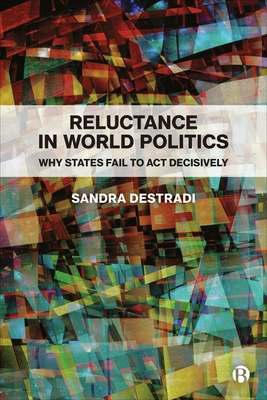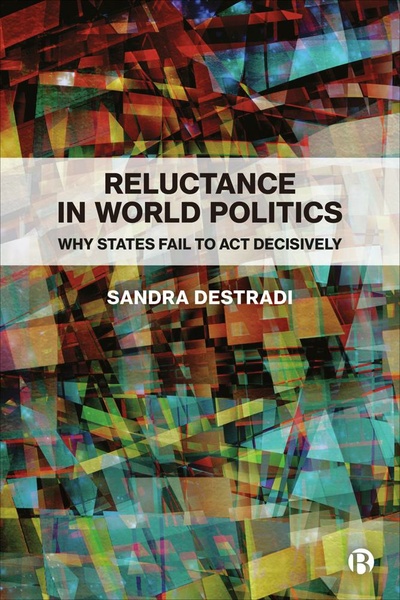Published
31 Jul 2023Page count
234 pagesISBN
978-1529230246Dimensions
234 x 156 mmImprint
Bristol University PressPublished
31 Jul 2023Page count
234 pagesISBN
978-1529230239Dimensions
234 x 156 mmImprint
Bristol University PressPublished
31 Jul 2023Page count
234 pagesISBN
978-1529230253Dimensions
234 x 156 mmImprint
Bristol University PressPublished
31 Jul 2023Page count
234 pagesISBN
978-1529230253Dimensions
234 x 156 mmImprint
Bristol University PressWhy do international actors, including powerful states, often fail to develop clear foreign policies and instead adopt indecisive, ‘muddling-through’ approaches?
This book develops a concept and a theory of reluctance in world politics. Applying it to the study of regional crisis management by leading powers, it finds that reluctance emerges when governments fail to devise clear foreign policy preferences and face competing international pressures.
The study of reluctance in world politics sheds new light on some of the most pressing problems of our time, from weak crisis management to cooperation deficits in global governance.
“This timely, original and nuanced book addresses a major paradox in international relations: why do states with the power to act so often fail to do so?” Ian Hall, Griffith University
“Timely and innovative … effectively shows the value of reluctance and its two dimensions: hesitation and recalcitrance which drive this type of foreign policy behaviour, illustrated by case studies of Brazil, Germany and India. An insightful contribution that broadens our understanding of foreign policy behaviour, both theoretically and empirically.” Leslie Wehner, University of Bath
“Theoretically rigorous and empirically rich, Destradi’s book is a critical intervention that explains reluctance in world politics.” Avinash Paliwal, SOAS University of London
“A conceptually and theoretically solid book on the much-understudied subject of reluctance in international politics. A must-read for scholars and practitioners alike.” T.V. Paul, McGill University
"A masterful study into a widespread, yet little studied, pattern of state behaviour in world politics: reluctance. Its findings are essential for understanding why states often fail to act decisively in international crises.” Kai Oppermann, Chemnitz University of Technology
Sandra Destradi is a Professor in the Department of Political Science and Chair for International Relations at the University of Freiburg. Previously, she was a Professor of International Relations and Regional Governance at the Helmut Schmidt University, a Senior Research Fellow at the German Institute for Global and Area Studies in Hamburg, and a Jean Monnet Fellow at the Robert Schumann Centre of the European University Institute. Her research interests include the impact of populism and authoritarianism on foreign policy, emerging powers and global governance and (trans)regional security dynamics in the Global South and beyond.
1. Introduction
2. Conceptualizing Reluctance
3. Theorizing Reluctance in World Politics
4. India’s Reluctant Crisis Management in South Asia
5. Germany’s Mixed Approach: Not Always a Reluctant Hegemon
6. Brazil’s Non-Reluctant Approach to Regional Crisis Management
7. Explaining Reluctance in Other Contexts
8. Conclusion









